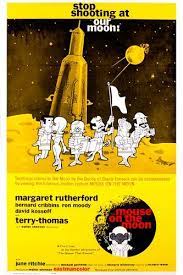
The tiny country of Grand Fenwick is having a bad year. Their only export, wine, has a tendency to explode when you open the bottle. It has something to do with the wine containing a radioactive element. Since Grand Fenwick cannot sell their wine Prime Minister Rupert Mountjoy (Ron Moody) has come up with a plan. He wants to get a loan from the U.S. for half a million dollars. They plan on telling America that they want to use the money to enter the space race and send a man to the moon. In reality he wants to use the money to put plumbing in the castle.
The Americans are well aware that Grand Fenwick has no intention of going to the moon, and are aware of their plumbing problem, but they see an opportunity to pretend to promote international cooperation in the space race. Using that as a propaganda tool they give Grand Fenwick a million dollars as a gift. Not to be outdone in the good will department the Russians give them an old, outdated rocket. Mountjoy plans on pretending to launch the rocket and having it explode instead. That way they look like they have a space program to justify the expenditure of the money.
Grand Fenwick’s resident scientist, Professor Kokintz (David Kosoff) has actually been working on a way to launch a rocket to the moon but never had the money to do it. The Prime Minister’s son, Vincent (Bernard Cribbins) has just returned from being educated in Britain. Vincent has always wanted to be an astronaut and is disappointed at his father’s duplicity. Vincent and Professor Kokintz get together and decide to actually launch the Russian rocket into space.
Britain sends a spy, Maurice Spender (Terry Thomas) to find out the truth. Spender reports back that Grand Fenwick is actually using the money for plumbing and assures his superiors that the tiny nation has no intention of launching anything and has no ability to do so if they wanted to. He doesn’t realize that Professor Kokintz has found a way to use Grand Fenwick’s explosive wine as fuel and excess plumbing supplies to get the rocket to function. Everyone, including Mountjoy, is amazed when the slow-moving rocket actually takes off.
“The Mouse on the Moon” was released in 1963 and was directed by Richard Lester. It is a British science fiction satirical comedy and a sequel to the movie “The Mouse That Roared” 1959. The movie is based on the book “The Mouse on the Moon” written in 1962 by Leonard Wibberley. Wibberley wrote several “The Mouse That” books.
The main difference between this film and “The Mouse That Roared” is Peter Sellers. Sellers, who had played three roles in the first film, did not return for this sequel and was replaced by Margaret Rutherford as the Grand Dutchess and Ron Moody as Prime Minister Rupert Mountjoy. Bernard Cribbins plays Vincent Mountjoy as opposed to Sellers’ third character Tulley Bascombe. Granted Sellers’ dry subtle wit is missing but “The Mouse on the Moon” is still a decent although not great film. There are still some nice satirical situations between nuclear powers and a lot of dry humor to keep you smiling.
When Wibberley heard about the peace treaty negotiations between the U.S. and Japan after WWII he wrote an article suggesting that Ireland, his native country, make a token invasion into the U.S. to get aid. It then gave him the idea for the novel but inventing Grand Fenwick as the invaders.
This is Director Lester’s first theatrical film. He would go on to direct “A Hard Day’s Night” 1964, The Beatles “Help” 1965, “A Funny Thing Happened on the Way to the Forum” 1966, “The Bed Sitting Room” 1969, “Superman II” 1980 and “Superman III” 1983.

